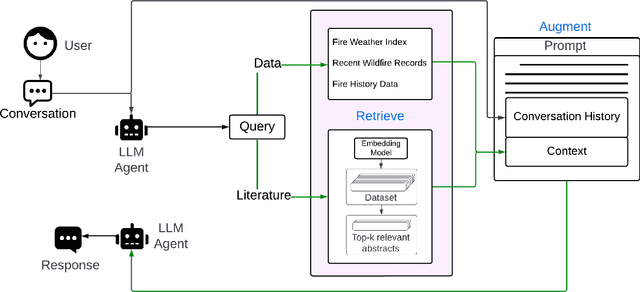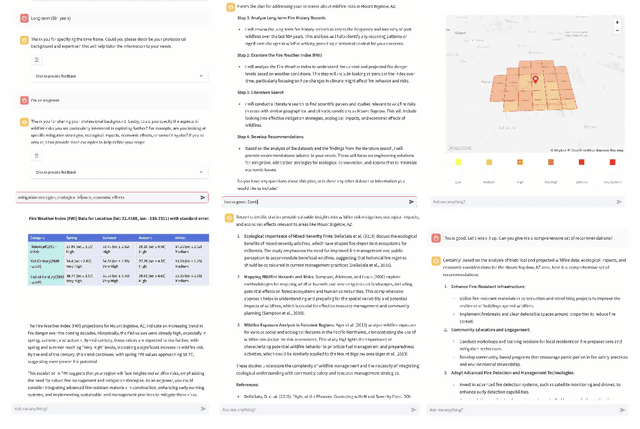John K. Hutchison
A RAG-Based Multi-Agent LLM System for Natural Hazard Resilience and Adaptation
Apr 24, 2025Abstract:Large language models (LLMs) are a transformational capability at the frontier of artificial intelligence and machine learning that can support decision-makers in addressing pressing societal challenges such as extreme natural hazard events. As generalized models, LLMs often struggle to provide context-specific information, particularly in areas requiring specialized knowledge. In this work we propose a retrieval-augmented generation (RAG)-based multi-agent LLM system to support analysis and decision-making in the context of natural hazards and extreme weather events. As a proof of concept, we present WildfireGPT, a specialized system focused on wildfire hazards. The architecture employs a user-centered, multi-agent design to deliver tailored risk insights across diverse stakeholder groups. By integrating natural hazard and extreme weather projection data, observational datasets, and scientific literature through an RAG framework, the system ensures both the accuracy and contextual relevance of the information it provides. Evaluation across ten expert-led case studies demonstrates that WildfireGPT significantly outperforms existing LLM-based solutions for decision support.
WildfireGPT: Tailored Large Language Model for Wildfire Analysis
Feb 12, 2024


Abstract:The recent advancement of large language models (LLMs) represents a transformational capability at the frontier of artificial intelligence (AI) and machine learning (ML). However, LLMs are generalized models, trained on extensive text corpus, and often struggle to provide context-specific information, particularly in areas requiring specialized knowledge such as wildfire details within the broader context of climate change. For decision-makers and policymakers focused on wildfire resilience and adaptation, it is crucial to obtain responses that are not only precise but also domain-specific, rather than generic. To that end, we developed WildfireGPT, a prototype LLM agent designed to transform user queries into actionable insights on wildfire risks. We enrich WildfireGPT by providing additional context such as climate projections and scientific literature to ensure its information is current, relevant, and scientifically accurate. This enables WildfireGPT to be an effective tool for delivering detailed, user-specific insights on wildfire risks to support a diverse set of end users, including researchers, engineers, urban planners, emergency managers, and infrastructure operators.
 Add to Chrome
Add to Chrome Add to Firefox
Add to Firefox Add to Edge
Add to Edge